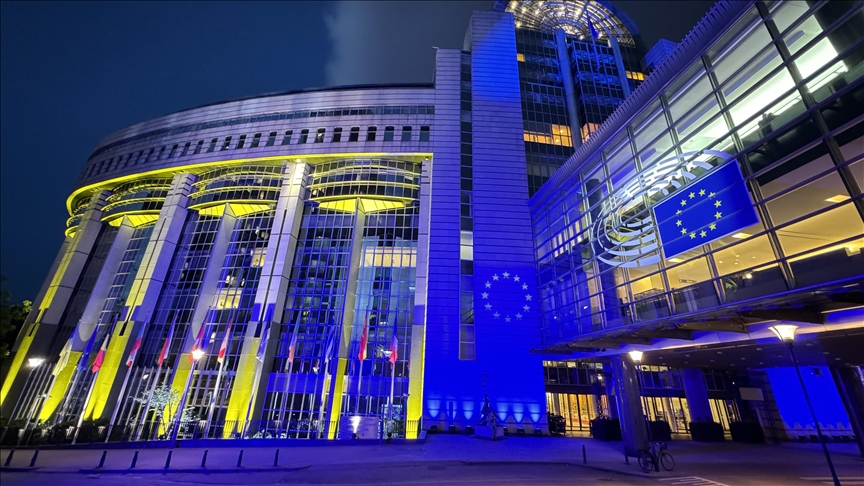FACTBOX - European election results: Mixed bag of victories, setbacks
While right-wing factions experienced notable gains, greens and liberals faced a challenging night

LONDON/GENEVA
Far-right parties have made significant gains in the EU parliamentary elections, although the mainstream parties retained control of the 705-member parliament.
The turnout in the European Parliament elections is predicted to be 48.8 %.
🇪🇺 The results of the European Parliament elections so far, according to latest data ⤵️
— Anadolu English (@anadoluagency) June 10, 2024
🇮🇹 Italian Prime Minister Meloni's party came in first
🇫🇷 French President Macron decides to call early elections after far-right victory
🇧🇪 Belgian Prime Minister De Croo announces his… pic.twitter.com/DQc9mfQT5s
According to the latest data, Luxembourg holds the highest voter turnout with 82.3%, while Croatia has the lowest with 21.3%.
Winners and Losers
The election produced a complex tapestry of outcomes, ensuring that celebrations will be far from unanimous across the continent.
While the right-wing factions made notable gains, the greens and liberals faced a challenging night.
French President Emmanuel Macron, in particular, suffered a significant setback, prompting him to dissolve the national parliament and announce snap elections.
Ursula von der Leyen's path
European Commission President Ursula von der Leyen emerged as one of the night's prominent figures.
With the possibility of forming a coalition with Socialists, Liberals, and her own center-right European People's Party, Von der Leyen is in a strong position.
These groups, which have supported her throughout her current term, are expected to command around 407 votes in the chamber -- well above the 361 needed to secure her second mandate.
However, the risk of defections means that her victory is not guaranteed, and she still requires the backing of the European Union’s national leaders in the European Council.
The EPP had a successful night, winning in multiple countries, including Germany, Spain, Poland, Bulgaria, Slovenia, Lithuania, Luxembourg, the Greek Cypriot administration, Latvia, Estonia, Finland, Croatia, and Greece.
They also surpassed expectations in the Netherlands, picking up six seats.
Giorgia Meloni's victory in Italy
Italian right-wing leader Giorgia Meloni celebrated a significant victory, outpacing her rivals and solidifying her position as a major political force in Italy.
Along with Poland's Donald Tusk, she is one of the few leaders of a large EU country to win a clear majority, increasing her vote share from the 2022 election.
Far-Right Surge
Marine Le Pen’s far-right National Rally was a major story, with its strong performance prompting Macron to dissolve parliament.
Far-right parties also came first in Austria, tied for first in the Netherlands, and secured second place in Germany and Romania.
French far-right firebrand Eric Zemmour’s Reconquest party managed to gain representation in Parliament as well.
Socialists
Europe’s center-left Socialists had a mixed but resilient performance.
They secured second place in significant countries like Spain and Italy and came in a close third in France, where Raphael Glucksmann revitalized the center-left.
However, the German Socialists, led by Chancellor Scholz, finished a disappointing third place behind the far-right Alternative for Germany party.
In Malta, European Parliament President Robert Metsola achieved a milestone by winning an additional seat for her party and receiving over 87,000 first preferences.
Losers
French President Emmanuel Macron suffered a significant setback as his party, La Republique En Marche, finished a distant second, barely edging out the Socialists -- a party once thought to be in political oblivion.
That is why, following a crushing defeat in elections by the far-right National Rally, Macron on Sunday dissolved the lower chamber of the French parliament, known as the National Assembly, and called snap elections.
Like Macron, German Chancellor Olaf Scholz also suffered a stinging blow in the exit poll, with his Social Democrats scoring 14%, while the mainstream Christian Democrats Party came top with 29.5% of the vote and the far-right Alternative for Germany took second place with 16.5%.
Scholz now faces mounting pressure from the center-right to emulate Macron by calling an early election.
The Greens, who had a strong showing in 2019, also saw their influence wane, dropping from 21 seats to as few as 12.
They managed to hold on in France but failed to secure any seats in Portugal.
Hungarian Prime Minister Viktor Orban, known for his nationalist stance, experienced a worse-than-expected performance. His Fidesz party garnered 43.8% of the vote, their lowest ever in a European Parliament election.
Belgium's Prime Minister Alexander De Croo, leader of the Flemish Liberals and Democrats (Open VLD), announced that he is stepping down as the leader of his nation after the election results.
Open VLD has taken in just 6% of the votes, 90% of which have been counted, at the EU elections.
De Croo is among the European leaders who have raised their voices the most against Israel's war in Gaza and the resulting civilian casualties.
As the dust settles from Sunday’s elections, the political landscape of the European Parliament is set for an intriguing and potentially tumultuous term ahead, with power balances shifting and new alliances forming.
Anadolu Agency website contains only a portion of the news stories offered to subscribers in the AA News Broadcasting System (HAS), and in summarized form. Please contact us for subscription options.




